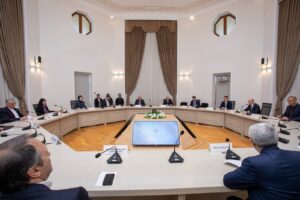Nuclear Weapons Have No Place in Iran’s Defense Doctrine: President Pezeshkian

Tehran, The Gulf Observer: President of the Islamic Republic of Iran, Masoud Pezeshkian, has reiterated that nuclear weapons have no place in Iran’s defense doctrine, affirming that the country’s position is rooted in a religious decree (fatwa) issued by the Leader of the Islamic Revolution, Ayatollah Seyyed Ali Khamenei.
In an interview with Oman TV conducted during his official visit to Muscat on May 27–28, and published by the president’s official website on Thursday night, President Pezeshkian underscored Iran’s long-standing opposition to nuclear armament.
“If the United States wants to be assured that the Islamic Republic is not pursuing nuclear weapons, it should know that such assurance stems from our religious beliefs. Based on the fatwa of the Leader of the Islamic Revolution, Iran has never sought and will never seek to produce or acquire nuclear weapons,” Pezeshkian stated.
The Iranian president emphasized that while Iran is willing to provide guarantees regarding its peaceful intentions, the country will not compromise on its right to enrich uranium in accordance with international law.
“We will never stop uranium enrichment used for diagnostics, treatment, agriculture, health, and industry. Enrichment is our legal right, and no one can deny that. Science belongs to all of humanity, and every nation has the right to benefit from scientific progress,” he affirmed.
Pezeshkian described the nation’s resilience in upholding this right as a point of pride, adding, “We will never yield to pressure to abandon enrichment. This steadfastness is a badge of honor for the Islamic Republic, and we will continue on this path.”
During the interview, President Pezeshkian also acknowledged Oman’s constructive role in facilitating indirect nuclear negotiations between Iran and the United States. He commended the Sultanate’s diplomatic efforts, expressing appreciation for its continued engagement in promoting balanced, win-win outcomes.
“Ayatollah Khamenei has praised Muscat’s mediation efforts, and we believe Oman can help create the conditions for more effective and fruitful negotiations,” the president noted.
Addressing regional security, President Pezeshkian firmly rejected accusations that Iran poses a threat to the Middle East. Instead, he pointed to Israel as the principal source of instability in the region.
“Those who claim to champion human rights have assassinated our scientists and continue to bomb civilians, including women, children, and the elderly. These are the real sources of insecurity. They have no legitimacy to accuse Iran of terrorism,” he stated.
Pezeshkian reaffirmed Iran’s commitment to peace, stating that the country seeks dignity for itself and the broader Islamic world, and desires constructive relations with all nations. However, he stressed that Iran will not succumb to intimidation or coercion.
In his concluding remarks, President Pezeshkian called on Islamic nations to strengthen unity and cooperation through dialogue, emphasizing the importance of solidarity in advancing shared goals.
“With rich natural resources, ancient civilizations, and immense cultural heritage, Islamic countries have the capacity to become influential actors on the global stage,” he said, encouraging Muslim leaders to foster collaboration in the fields of economy, science, industry, and culture.


